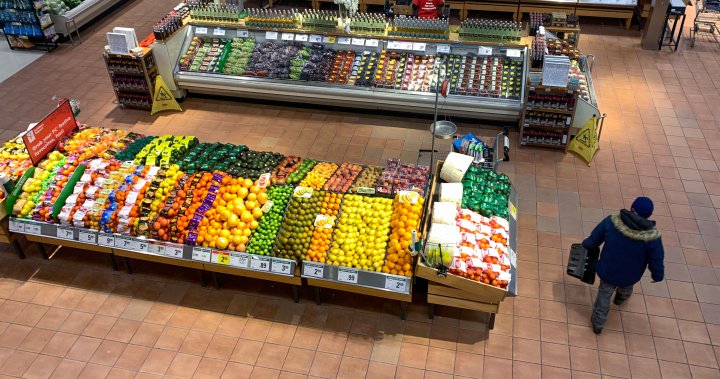U.S. President Donald Trump’s tariffs have fuelled a surge in people vowing online to “Buy Canadian.”
And while experts say there are ways to find alternatives to the big U.S. brands, there may still be some difficulty.
The push to buy domestically ramped up after Trump announced his long promised 25 per cent tariff on Canadian goods, with Canada planning to retaliate with $30 billion worth on American products, both set to take place Tuesday.
The tariffs will then rise to $125 billion in 21 days if the U.S. doesn’t remove the tariffs.
Tyler McCann, managing director of the Canadian Agri-Food Policy Institute, said buying Canadian is a great way to invest in the country’s food system.
“The idea, the concept of buying more local really is just important and it’s a good one,” he said. “It’s really a good way overall to make our food system more resilient.”

He said when Canadians head to the store, people should not look at only the brand to determine if they’re buying local, but also at the label for information, including if it has a maple leaf on it.
According to the Canadian Food Inspection Agency (CFIA) this typically signifies “all or virtually all major ingredients, processing and labour used to make the food product are Canadian.”
Food economist Michael von Massow at the University of Guelph said while people might think to avoid U.S. brands like Lays potato chips or Samsung electronics, he cautions Canadians may need to consider alternatives they’re not used to, especially in the case of food.
If your favourite Kellogg’s cereal, for example, doesn’t have a Canadian alternative, you may have to try a different product in order to stay Canadian, he said.
“If we’re dedicated to that ‘shop Canadian,’ then we may have to switch and look at alternatives that might be in the same broad category, but not identical to what we prefer,” von Massow said.
Difficulties to buying Canadian
But the plan to buy Canadian is not without issue. McCann noted most of the food Canadians buy is from all over the world and that can make it difficult to know what is — and is not — Canadian.

Get breaking National news
For news impacting Canada and around the world, sign up for breaking news alerts delivered directly to you when they happen.
According to a report by the institute in June 2023, about 80 per cent of Canada’s fruits and 60 per cent of its vegetables are imported from other countries, with a large portion from the U.S., Mexico and other Latin American countries.
This is especially true in the winter, when certain produce cannot be grown in the country, resulting in consumers turning to either frozen fruits and vegetables, such as blueberries grown and frozen in Canada, or turning to other countries.

“This is an inherent part of one of the reasons why trade is a good thing, because it does give us this global supply, this yearlong supply of food from all around the world,” he said. “But it also in this situation creates a real issue at the end of the day.”
However, while people may want to avoid American products even if many products come from the country, von Massow noted Canada is an exporting country and there isn’t a need to punish all countries just to avoid the U.S.
“It’s less about buying Canadian, which is good, and more about not buying American,” von Massow said.
If Canadians are still curious about whether a product may be produced in Canada, such as if it doesn’t have the “Product of Canada” wording, he said you can also call the company to ask them directly.
Canadian-made brands to buy
If you decide to stick to Canadian brands for food, here’s a list of examples of products that are made in Canada by Canadian companies, with some products recommended by tracking website Made in Ca.
Dairy: Anything with the Blue Cow logo is made with 100 per cent Canadian milk and milk ingredients, according to the Dairy Farmers of Canada.
Agropur, Gay Lea, Lactalis Canada are all Canadian companies and package things like milk, butter, sour cream and whipping cream.
Cracker Barrel, Black Diamond and Upper Canada Creamery make various cheese products.
Chapman’s, Shaw’s, Kawartha Dairy and Millers Dairy make ice cream.
Cereal: Rogers Foods, Nature’s Path, Sunny Boy Foods and One Degree Organics are some Canadian brands.
Bread and grains: Wonderbrands, Stone Mill Bakehouse and O’Doughs for bread; K2 Milling and Rogers Food for flour; Arva Flour Mills for organic flour; Yumi Organics for oats and energy bars.
Alcohol: There are hundreds of local distilleries, breweries and wineries in your province, subject to interprovincial trade barriers.
Meat and seafood: Maple Leaf Foods, the Great Canadian Meat Company, Direct Plus Food Group and Premium Brands are some Canadian companies, in addition to local stores.
Snacks: Dare Foods, Celebration Cookies, Laura Secord Chocolates, Maple Leaf Cookies, La Cocina Tortilla Chips, and Purdy’s Chocolate are some Canadian snack food companies.
Paper products (toilet paper, paper towels): Purex, Kirkland, Cashmere, Cascades and Royale are all available for toilet paper needs, Cascades and Royale for paper towels and other paper products.
Toiletries: Green Beaver, Nelson Naturals and SD Naturals for toothpaste, mouthwash, dental floss. Yukon Soaps, the Rocky Mountain Barber Company, The Unscented Company for soaps, shampoos and conditioner.
Cleaning Products (garbage bags, detergent, cleaners): Glad for garbage bags, Hertel, Attitude, Biovert for cleaning products, Nellie’s, AspenClean and The Bare Home for laundry and dish detergent
Clothing: Peace Collective, KOTN, Simons, Province of Canada, and many more.
Are you a Canadian business owner? We want to hear how you’re getting the word out to people looking to “Buy Canadian,” or how you’re adjusting your own supply chains in light of the tariffs. Reach out to us using the contact form or email [email protected].
Want to buy Canadian? How to find alternatives to big U.S. brands





